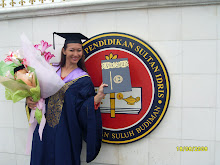Ramai di kalangan kita meminati bidang muzik sama ada secara formal atau tidak formal. Adakah minat itu lahir secara semulajadi atau melalui pengalaman belajar muzik? Fikirkan sejenak........
Artikel di bawah membincangkan topik 'Nature or Nuture' yang telah ditulis oleh Dr. Benjamin Spock
( http://www.drspock.com/article/0,1510,3945,00.html)
Nature or Nuture??
by Dr. Benjamin Spock
reviewed by Robert Needlman, M.D. F.A.A.P
The question of nature vs. nuture is a question about how much parents really shape a child's personality ( nuture ), and how much is simply a matter of biology, beyond anyone's control ( nature ). As a parent, how you answer this question makes a big difference. Can you make your child smarter by playing classical music all day long? Do you feel personally responsible because your child is difficult in preschool?
Making Sense Of The Mysterious Process
Theories abound. Some believe that the process of development is all to heredity. We are born with certain talents and personalities, and these are the biggest determinant of who we are and what we become. These scientists use as evidence the fascinating studies of identical twins who are were reared in different families but who nonetheless bear striking, sometimes uncanny, similarities to each other. Others contend that we are all pretty much totally the product of our environments. We learn to do what the environment rewards, and not to do what the environment punishes. This school of thought lies behind many time-honored discipline strategies, such as timeout, sticker charts, and taking away privileges.
A Little Of Both
Probably a kernel of truth lies within both.
Certainly, no one would deny that children are born with different temperaments and follow different developmental timetables. On the other hand, there is no question that how a child is raise has a lot to do with the kind of adult she becomes. In extreme cases, the environment can be so damaging that the child's innate talents never blossom. The transactional model of child development helps to resolve this split between nature and nuture. A person is neither the product of just her environment nor just her genetic makeup. Rather, it is the complex interaction between the two that is key.
Let me give an example. A child is born with talent for music. The parents notice that he likes singing and listening to music, so they play even more music and give him a toy xylophone at age two. The child's growing interest and skill with music spurs the parents to offer even more musical experiences, which in turn fuel the child's talent and desire to play.
In this case, both child's talent and his environment affected his development. The child was born with a talent for music, yes. But that talents changed the environment by inducing his parents to provide more musical experiences. Those experiences, in turn, fueled the child's talent and motivation, which in turn motivated his parents to provide even more musical enrivhment, and so on.
The transactional model explains why brothers and sisters always grow up in a "different" family. A firstborn child grows up with very different experiences than a middle or youngest child. Parents never respond to two children exactly the same, even if they are very careful not to play favorites. The unique personality of each child brings forth different behaviors from the people around him. A child who is temperamentally difficult to raise has a very different experience with her parents than does her easygoing brother. The child changes environment, which in turn changes the child. The child's development is a complex dance in which nature and nuture both lead and are led.
Tuesday, September 29, 2009
Subscribe to:
Comments (Atom)
